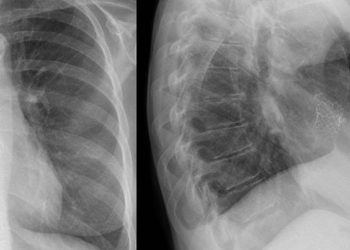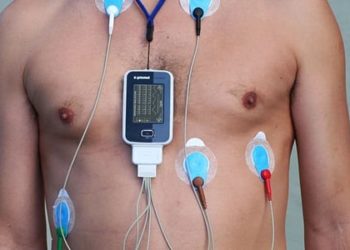Systematic screening for atrial fibrillation may reduce morbidity and mortality in older patients
1. There were significantly fewer events in the intervention group (5.45 per 100 years) compared to control (5.68 per 100 years; p=0.045).
2. The number needed to invite to screen to prevent the composite primary outcome was 91.
Evidence Rating Level: 1 (Excellent)
Study Rundown: There is strong association between atrial fibrillation and cardioembolic stroke. It is believed that early management of patients with atrial fibrillation (AFib) may reduce morbidity and mortality. Until now, little research has been conducted in this domain. This randomized controlled trial aimed to determine whether timely screening for AFib affects the incidence of stroke, systemic embolism, and all-cause mortality. Co-primary endpoints included 5-year incidence of ischemic or hemorrhagic stroke, systemic embolism, severe bleeding, and all-cause mortality. Individuals were given the choice of management with oral anticoagulants if AFib was suspected on screening. According to results, significantly fewer primary endpoint events occurred among individuals screened for AFib compared to those who were not. This study was strengthened by a long follow-up, large sample size, and inclusion of individuals at high-risk of cardiovascular disease.
Click to read the study in The Lancet
Relevant Reading: Early Rhythm-Control Therapy in Patients with Atrial Fibrillation
In-depth [randomized controlled trial]: Between Mar 1, 2012, and May 28, 2014, 28 768 patients were assessed for eligibility. Included were patients living in Halland and Stockholm between 75 and 76 years of age. Enrolled participants were followed for a minimum of 5 years. Altogether, 27 975 patients (13 979 in screening group and 13 996 in control group) were included in the analysis. With regard to the primary endpoint, significantly fewer events occurred in the AFib screening group (5.45 events per 100 years, 95% confidence interval [CI] 5.52-5.61) compared to control (5.68 events per 100 years, 95% CI 5.52-5.85, hazard ratio 0.96, p=0.045). However, there were no significant differences between the groups with respect to the individual components of the composite primary outcome. Furthermore, all-cause death comprised the majority of adverse events (71.2%), followed by severe bleeding (31.7%), ischemic stroke (17.6%), hemorrhagic stroke (3.2%), and systemic embolism. Overall, findings from this study suggest that early screening and timely management of atrial fibrillation in older patients may prevent further complications.
Image: PD
©2021 2 Minute Medicine, Inc. All rights reserved. No works may be reproduced without expressed written consent from 2 Minute Medicine, Inc. Inquire about licensing here. No article should be construed as medical advice and is not intended as such by the authors or by 2 Minute Medicine, Inc.







